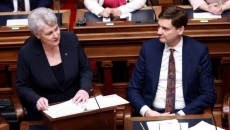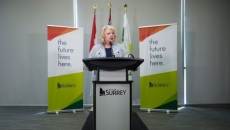Inflation and higher interest rates have eroded Canadians' purchasing power since 2022, particularly for lower-income households, a new report from the parliamentary budget officer has found.
But wealthier households have seen their purchasing power rise thanks in big part to their investment income.
Over a longer time period — since the last quarter of 2019 — the average purchasing power of Canadian households rose by 21 per cent.
Government transfers, wage gains and net investment income supported the gain, said Parliamentary Budget Officer Yves Giroux in the report.
"However, this conclusion does not provide a full picture of the recent changes to purchasing power in Canada," the report said. "In fact, it is widely accepted that inflation and the accompanying tightening of monetary policy have affected household purchasing power disproportionately, depending on income level."
For the lower-income households, "small increases in income were not enough to counteract the effect of inflation on their purchasing power."
On average during this period, households have experienced price increases of about 15 per cent on a typical "basket" of goods and services, the report said.
Spending on food, shelter and transportation accounted for more than three-quarters of inflation, though these categories made up less than half of the 2019 consumption bundle.
Inflation began heating up in 2021 as raw material costs and supply chain disruptions put pressure on prices, the report noted.
As inflation sharply accelerated in 2022, household purchasing power declined. Meanwhile, the Bank of Canada rapidly increased its key interest rate from its pandemic-era lows, bringing it up to five per cent by mid-2023 before hitting pause.
The Consumer Price Index reached an all-time high of 8.1 per cent in June 2022, and has slowed ever since under the weight of rate hikes by the Bank of Canada.
While higher interest rates weighed on many households as the cost of their mortgage payments rose, it also helped boost investment income, the report said.
The investment income of the wealthiest 20 per cent of households grew faster than their interest payments, leading to a net increase in income over inflation and boosting their purchasing power in 2023.
For other households, interest payment increases on average were higher than their investment income last year.
As a result, households in the third and fourth quintiles saw their purchasing power stagnate, while the lowest-income households saw their power deteriorate.
"In summary, the purchasing power of most households remained higher in the first quarter of 2024 than in the last quarter of 2019," the report said.
"However, since 2022, rising inflation and tighter monetary policy have eroded purchasing power, particularly among lower-income households."
The Bank of Canada started cutting its key rate earlier this year as inflation neared its target, and is expected to continue.
Lower interest rates are "a source of really great relief" for homeowners, said Finance Minister Chrystia Freeland at a press conference on Tuesday.
"We were the first G7 country to cut interest rates for the third time. Wages have been outpacing inflation for 19 months in a row," she said.
"What all of that means for Canadians is their paycheques are going further."






